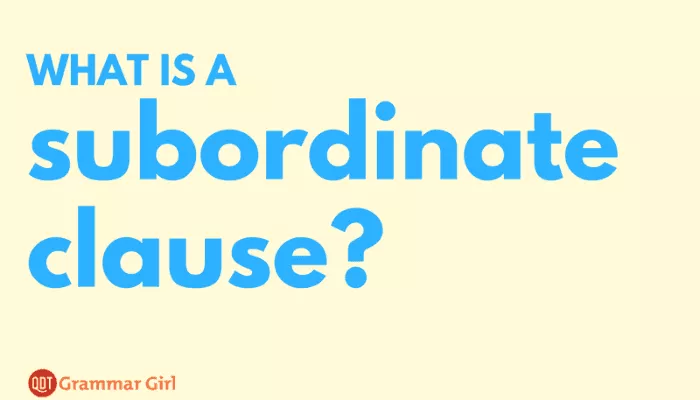Phrases and clauses are both groups of words that work together in a sentence. The difference is that a clause has a subject and a verb—often, a clause could be a sentence if it were all by itself, and when it could be, we call it a main clause or an independent clause.
Zombies hunt the surviving humans. [main clause]
A phrase, on the other hand, is missing something. Phrases work within sentences. There are prepositional phrases, noun phrases, and so on. Phrases can play a lot of different roles in a sentence, but they work with main clauses. Somewhere, every sentence must have a main clause. Here’s an example of a prepositional phrase followed by a main clause.
On the TV show The Walking Dead, zombies hunt the surviving humans.
[prepositional phrase] [main clause]
Subordinating Conjunctions
Subordinate clauses get their name from the fact that they always start with a subordinating conjunction such as since, because, although, and while.
Fragments
“Subordinate clause” is the name you’re more likely to have learned in school, but the other name, “dependent clause,” may help you better understand what they do because adding that subordinating conjunction to the head of the clause makes it dependent on a main clause. A dependent clause without a main clause is a fragment. The dependent clause needs the main clause—it depends on the main clause—to make it a proper sentence. Fragments are generally frowned upon in business writing, but you do often see them in fiction, especially in dialog because they create a conversational, punchy, informal tone.
I know summer is right around the corner. [main clause]
The days are getting longer. [main clause]
Because the days are getting longer. [fragment]
I know summer is right around the corner because the days are getting longer. [complex sentence with a main clause followed by a dependent clause]
Subordinate Clauses
You may have been taught not to start a sentence with the word because (one of the subordinating conjunctions), but that is a fib used by beleaguered teachers to keep small children from writing sentence fragments (e.g., Before Bobby leaves! Unless Marta brings cookies! When the ice cream man comes!)
A subordinate clause can go at the beginning of a sentence or later in a sentence. The only difference is that if it goes at the beginning, you need a comma after the subordinate clause, and if goes later, you don’t need a comma.
Here are some examples with the subordinate clause at the beginning of the sentence:
Before Bobby leaves for practice, Mom always makes sure he has a bottle of water.
Unless Marta brings cookies, I will need to stop at the store on the way home.
When the ice cream man comes, I will be ready this time.
Here are some examples with the subordinate clause at the end of the sentence:
Mom always makes sure Bobby has a bottle of water before he leaves for practice.
I will need to stop at the store on the way home unless Marta brings cookies.
I will be ready this time when the ice cream man comes.
If it bothers you to start a sentence with because or other subordinating conjunctions (or if it bothers your boss), you can see that it’s easy to flip your sentence around and put the subordinating clause at the end—but you don’t have to. There’s no adult grammar rule against it.
Complex-Compound Sentences
Of course, sentences can get even more complex. For example, they can have more than one main (independent) clause joined to a subordinate (dependent) clause. These are called complex-compound sentences.
You still need a comma after the subordinate clause if it comes at the beginning of the sentence, and you also need a comma to join the two main clauses.
Before Bobby leaves for practice, Mom always makes sure he has a bottle of water, and Dad always makes sure he has his gear.
Unless Marta brings cookies, I will need to stop at the store on the way home, and I should also call Steve to let him know I’ll be late.
But if the subordinate clause comes in the middle, then the sentence doesn’t need the extra comma. Here are some examples with the subordinate clause in the middle:
Mom always makes sure Bobby has a bottle of water before he leaves for practice, and Dad always makes sure he has his gear.
I will need to stop at the store on the way home unless Marta brings cookies, and I should also call Steve to let him know I’ll be late.
Prepositions or Conjunctions?
Some subordinating conjunctions, such as before, after, and until, can also act as prepositions. The way to tell the difference is to remember that subordinate clauses are still a type of clause, meaning they always have a subject and verb.
If a word such as until is followed by a clause, it’s acting like a subordinating conjunction. If it is followed by just a noun or noun phrase, then it’s acting like a preposition. The good news is that either way, if it’s at the beginning of a sentence, you should put a comma after it.
Here’s an example where until heads up a prepositional phrase:
Until summer break, I need the car on weekdays. [until heads up a prepositional phrase]
Here’s an example where until heads up a subordinate clause:
Until we’re out of school, I need the car on weekdays. [until heads up a subordinate clause because we’re out of school has a subject and verb.]
In Summary
- In summary, Subordinating clauses make your sentences more interesting and complex. Just make sure they’re attached to a main clause and you put a comma after them if they come before the main clause.
- ———-
- This version of this article originally appeared in Office Pro Magazine.




